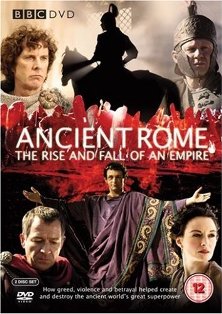 W
WAgrippina is an opera seria in three acts by George Frideric Handel with a libretto by Cardinal Vincenzo Grimani. Composed for the 1709–10 Venice Carnevale season, the opera tells the story of Agrippina, the mother of Nero, as she plots the downfall of the Roman Emperor Claudius and the installation of her son as emperor. Grimani's libretto, considered one of the best that Handel set, is an "anti-heroic satirical comedy", full of topical political allusions. Some analysts believe that it reflects Grimani's political and diplomatic rivalry with Pope Clement XI.
 W
WAncient Rome: The Rise and Fall of an Empire is a 2006 BBC One docudrama series, with each episode looking at a different key turning points in the history of the Roman Empire. This docudrama focuses on the Latin western half of the Roman Empire.
 W
WBoudica is a British television film released in 2003. Starring Alex Kingston, Steven Waddington and Emily Blunt, in her film debut, the film is a biopic of the queen of the Iceni tribe, Boudica.
 W
WDe Mulieribus Claris or De Claris Mulieribus is a collection of biographies of historical and mythological women by the Florentine author Giovanni Boccaccio, composed in 1361–62. It is notable as the first collection devoted exclusively to biographies of women in Western literature. At the same time as he was writing On Famous Women, Boccaccio also compiled a collection of biographies of famous men, De Casibus Virorum Illustrium.
 W
WFire Over Rome is a 1965 Italian peplum film directed by Guido Malatesta.
 W
WI, Claudius is a historical novel by English writer Robert Graves, published in 1934. Written in the form of an autobiography of the Roman Emperor Claudius, it tells the history of the Julio-Claudian dynasty and the early years of the Roman Empire, from Julius Caesar's assassination in 44 BC to Caligula's assassination in AD 41. Though the narrative is largely fictionalized, most of the events depicted are drawn from historical accounts of the same time period by the Roman historians Suetonius and Tacitus.
 W
WI, Claudius is a 1976 BBC Television adaptation of Robert Graves's 1934 novel I, Claudius and its 1935 sequel Claudius the God. Written by Jack Pulman, it stars Derek Jacobi as Claudius, with Siân Phillips, Brian Blessed, George Baker, Margaret Tyzack, John Hurt, Patricia Quinn, Ian Ogilvy, Kevin McNally, Patrick Stewart, and John Rhys-Davies. The series covers the history of the early Roman Empire, told from the perspective of the elderly Emperor Claudius who narrates the series.
 W
WL'incoronazione di Poppea is an Italian opera by Claudio Monteverdi. It was Monteverdi's last opera, with a libretto by Giovanni Francesco Busenello, and was first performed at the Teatro Santi Giovanni e Paolo in Venice during the 1643 carnival season. One of the first operas to use historical events and people, it describes how Poppaea, mistress of the Roman emperor Nero, is able to achieve her ambition and be crowned empress. The opera was revived in Naples in 1651, but was then neglected until the rediscovery of the score in 1888, after which it became the subject of scholarly attention in the late 19th and early 20th centuries. Since the 1960s, the opera has been performed and recorded many times.
 W
WNero and the Burning of Rome is a 1953 Italian epic historical drama film directed by Primo Zeglio and loosely based on real life events of Roman emperor Nero. It was based on the novel Nerone e Messalina (c.1949) by Harry Bluhmen.
 W
WMio figlio Nerone, released in the US as Nero's Mistress is a 1956 Italian historical comedy film directed by Steno and starring Alberto Sordi, Vittorio De Sica, Gloria Swanson and Brigitte Bardot, with cinematography by Mario Bava. It depicts a visit by the Roman Emperor Nero and his entourage to a coastal villa.
 W
WPer amore di Poppea is a 1977 Italian commedia sexy all'italiana directed by Mariano Laurenti and set in ancient Rome.
 W
WPoppea's Hot Nights is a 1969 Italian comedy film set in Ancient Rome. It was written and directed by Guido Malatesta and stars Olga Schoberová and Brad Harris in the main roles.
 W
WQuo Vadis is an Italian film directed by Enrico Guazzoni for Cines in 1913, based on the 1896 novel of the same name written by Henryk Sienkiewicz. It was one of the first blockbusters in the history of cinema, with 5,000 extras, lavish sets, and a lengthy running time of two hours, setting the standard for "superspectacles" for decades to come.
 W
WQuo Vadis is a 1924 Italian silent historical film directed by Gabriellino D'Annunzio and Georg Jacoby and starring Emil Jannings, Elena Sangro and Lillian Hall-Davis. It is based on the 1896 novel Quo Vadis by Henryk Sienkiewicz which was notably later adapted into a 1951 film.
 W
WQuo Vadis is a 1951 American epic historical drama film made by Metro-Goldwyn-Mayer (MGM) in Technicolor. It was directed by Mervyn LeRoy and produced by Sam Zimbalist, from a screenplay by John Lee Mahin, S.N. Behrman, and Sonya Levien, adapted from the novel Quo Vadis (1896) by the Polish Nobel Laureate author Henryk Sienkiewicz. The score is by Miklós Rózsa and the cinematography by Robert Surtees and William V. Skall. The title refers to an incident in the apocryphal Acts of Peter.
 W
WQuō vādis? is a Latin phrase meaning "Where are you marching?". It is also commonly translated as "Where are you going?" or, poetically, "Whither goest thou?".
 W
WQuo Vadis is a 2001 Polish film directed by Jerzy Kawalerowicz based on the 1896 book of the same title by Henryk Sienkiewicz. It was Poland's submission to the 74th Academy Awards for the Academy Award for Best Foreign Language Film, but was not nominated.
 W
WQuo Vadis: A Narrative of the Time of Nero, commonly known as Quo Vadis, is a historical novel written by Henryk Sienkiewicz in Polish.
 W
WThe Sign of the Cross is a 1914 American drama silent film directed by Frederick A. Thomson based on the 1895 play by Wilson Barrett. The film stars William Farnum, Rosina Henley, Sheridan Block, Morgan Thorpe, Ethel Grey Terry, Lila Barclay and George Majeroni. The film was released on December 21, 1914, by Paramount Pictures.
 W
WThe Sign of the Cross is a 1932 American pre-Code epic film produced and directed by Cecil B. DeMille and released by Paramount Pictures. Based on the original 1895 play by English playwright Wilson Barrett, the screenplay was written by Waldemar Young and Sidney Buchman. It stars Fredric March, Elissa Landi, Claudette Colbert, and Charles Laughton, with Ian Keith and Arthur Hohl.
 W
WThe Ten Gladiators is a 1963 Italian film directed by Gianfranco Parolini.